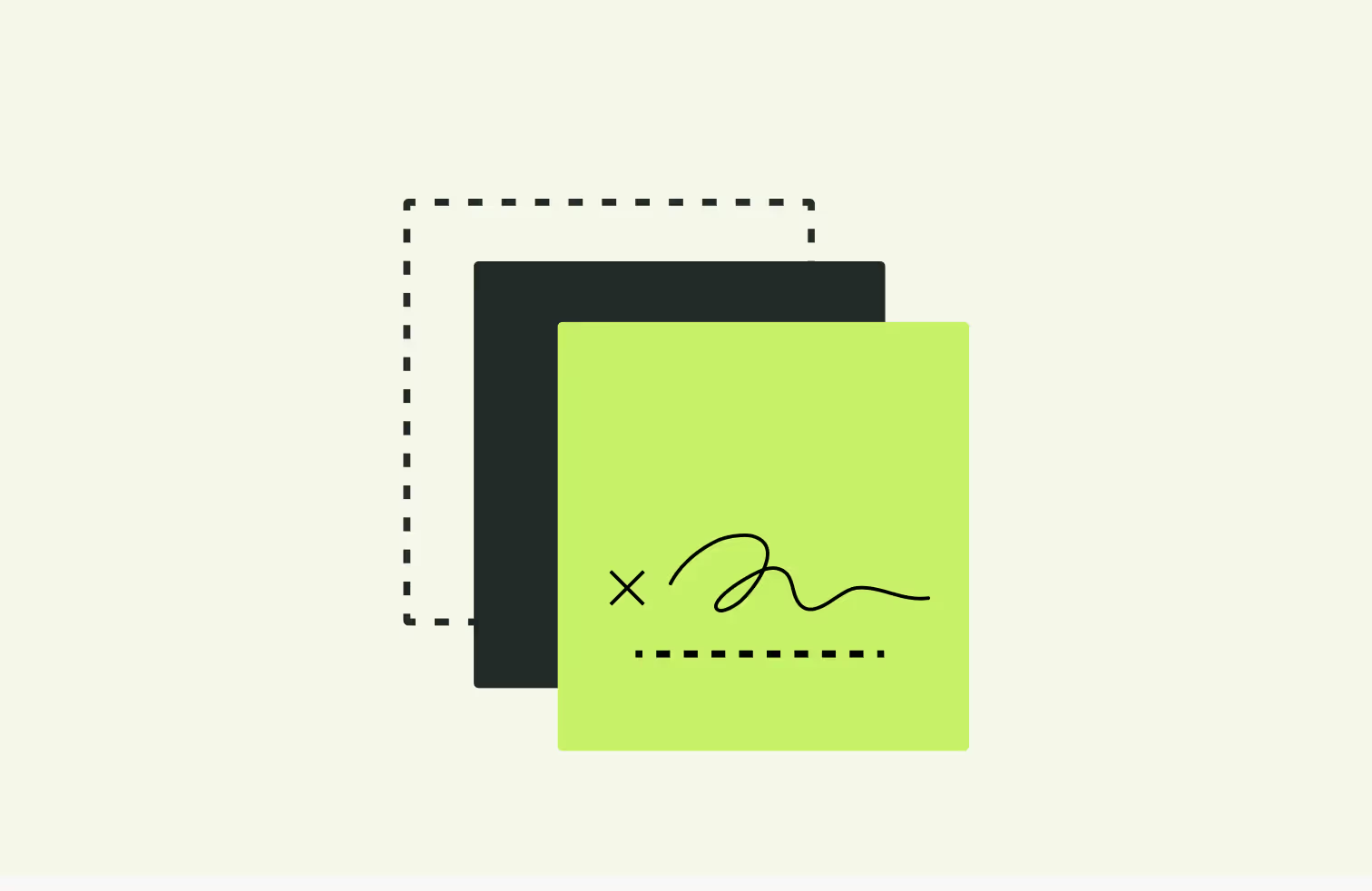Solutions
Customer Support
Resources
When you first enter into a contract, the last thing on your mind is ending it. But all contracts are discharged eventually.
How they’re discharged, however, may vary. This Juro guide explores what discharge of contract means, and all of the different ways a contract can be discharged. Let’s get started.
The discharge of a contract describes a situation whereby a contract is brought to an end. When a contract is discharged, the parties are all relieved of continuing to perform their obligations under the contract.
Before we discuss what the implications of discharging a contract are, we first need to understand how contracts can actually be discharged in the first place. This is important - how a contract was discharged will determine the consequences of the contract ending.

Let’s discuss the various methods of discharging a contract together now. The main ways that a contract can be discharged include through performance, breach, agreement or frustration.
A contract can be discharged through performance if all parties have already performed their contractual obligations in full.
As a general rule, all contract terms must have been completed in their entirety and exactly as described in order to discharge the contract.
Now let's go back to school for a moment to see what this rule looks like in practice.
The full performance rule was made clear in a famous case called Arcos Ltd v EA Ronaasen & Son. In this case, the defendants agreed to buy wood to make barrels with. They specified in the contract that this wood should be ½ inch thick. However, when it arrived, the wood was 9/16 inches thick.
Despite still being suitable to make the barrels, the court decided that the performance hadn’t been ‘satisfactory’ enough. Essentially, this meant that there hadn't been full performance, so the contract couldn’t be discharged on this basis.
However, the courts are slightly more lenient today about how closely goods need to match the description within the contract. But the rule remains that a contract can only be discharged by performance if all obligations are met fully.
That said, there will be situations where a party argues that their contractual obligations have been substantially performed, and therefore that the contract should still be discharged.
Let's look at an example together to understand when this might happen.
If Anna paid Robert $1,200 to deliver and plant 300 flowers for her garden, and Robert only delivers and plants 297, Robert might argue that he has performed the contract sufficiently enough for it to be discharged.
But Anna may be disgruntled and argue that they can’t discharge the contract since she is still missing three flowers.
However, you'd be surprised to know that the court could side with Robert on this one. Depending on how the contract was written and how significant the deviation is, the court could decide that the contract is discharged because Robert 'substantially' performed his obligation.
But why is this?
Well, since only three flowers out of 300 were missing, this example could be classed as a non-material breach under UK and US law. If this is the case, Robert will still be liable to pay Anna any damages for the value of the three missing plants. However, he could potentially still discharge a contract in this instance.
It’s worth noting that whether or not a contract has been performed substantially is fairly subjective. Therefore, it’s important to consult an attorney or lawyer when trying to discharge a contract on the basis of substantial performance.
Just as a contract can be discharged due to performance, it can also be discharged due to lack of performance. In other words, it can be discharged by a breach.
If one (or more) of the contracting parties fail (or refuse) to perform their contractual obligations, the innocent party is entitled to bring the contract to an end. But fear not. Doing this doesn't leave the innocent party at a loss.
Discharging a contract by breach typically involves compensating the innocent party for any losses suffered as a result of the contract ending. These are called damages.
But happens if one party says they won't perform their obligations under a contract before these obligations are due? Well, this is called an anticipatory breach, and it's still a sufficient ground to discharge of a contract.
If an anticipatory breach occurs, the innocent party has two options. Their first option is to discharge the contract and claim immediate damages for the anticipated breach. Their second option is to wait for the actual breach of a contract to happen when the contract’s deadlines pass, and discharge the contract then.
Again, what you decide to do will depend on your situation. Either way, it's always best to consult a lawyer first.

Parties can also discharge a contract by each agreeing to release each other from the contractual obligations within it. This agreement must be mutual and all parties must have the freedom to decide whether to discharge the contract or not.
If neither party has fulfilled its contractual obligations, this process is relatively straightforward.
However, if one of the parties has performed their part of the contract and the other has not, it's a bit more complicated. There needs to be some form of consideration provided to discharge a contract by agreement in this case.
For example, imagine that Anna had already paid Robert $1,200 to deliver and plant 300 flowers. For whatever reason, Robert decides that he is no longer willing to deliver and plant these, but offers, as the non-performing party, to plant 40 trees instead. Anna is happy with this trade, so she agrees to discharge the original contract.
By offering to plant 40 trees, Robert has provided consideration, which is a requirement of any contract. This means that the new agreement between Anna and Robert is capable of being binding and can be used to discharge the existing contract which involved the promise of planting 300 flowers.
If you want to discharge a contract by agreement, it’s important to create a separate contract that describes the new consideration that’s being provided. This makes the 'agreement' to discharge the orginal contract clear.

Lastly, a contract can become discharged if the contract is frustrated. But what does ‘frustration’ actually mean?
Well, within the UK, a contract can become ‘frustrated’ when a supervening event happens which makes the terms within them become impossible to perform, or changes the main purpose of the contract.
This event is not the fault of either party, and it’s usually unforeseen. This means that each party is discharged from future obligations under the contract, and neither party is liable for breaching the agreement.
However, there are specific rules surrounding when a contract can become frustrated and therefore discharged. Let's run through these rules now.
The first rule is that a contract can't be partially or temporarily frustrated. For example, in the Bank of New York Mellon v Cine-UK case in 2021, the court decided that a contract can’t be ‘temporarily frustrated’ and result in discharge. The court argued that a contract can only be fully frustrated. If a contract could be revived at a later stage, this wouldn’t amount to frustration, so the contract couldn’t be discharged.
The second rule is that frustration will also only occur when there isn’t a clause within the contract that covers the supervening event (e.g force majeure clauses).
Importantly, a contract also won’t be discharged if the contract can be performed using an alternative method.
The specific rules on whether the discharge of a contract is possible or not are often complex and depend on the situation, as well as where you’re located. As we mentioned earlier, it’s always best to discuss your situation with a legal professional to find out whether discharging a contract is an option or not.
As we’ve discussed, there are multiple ways in which a contract can be discharged.
However, the most common way to discharge a contract is through performance. This is also the best way to discharge a contract since it means that all parties will have received what they originally intended to when entering into the agreement.
If managing contractual obligations and upcoming contract deadlines is a challenge for your team, you may need contract automation.
Juro’s all-in-one contract automation platform that enables all teams to streamline the creation, execution and management of routine contracts at scale. Fill in the form below to find out more.

Lorem ipsum dolor sit amet, consectetur adipiscing elit. Suspendisse varius enim in eros elementum tristique. Duis cursus, mi quis viverra ornare, eros dolor interdum nulla, ut commodo diam libero vitae erat. Aenean faucibus nibh et justo cursus id rutrum lorem imperdiet. Nunc ut sem vitae risus tristique posuere.

